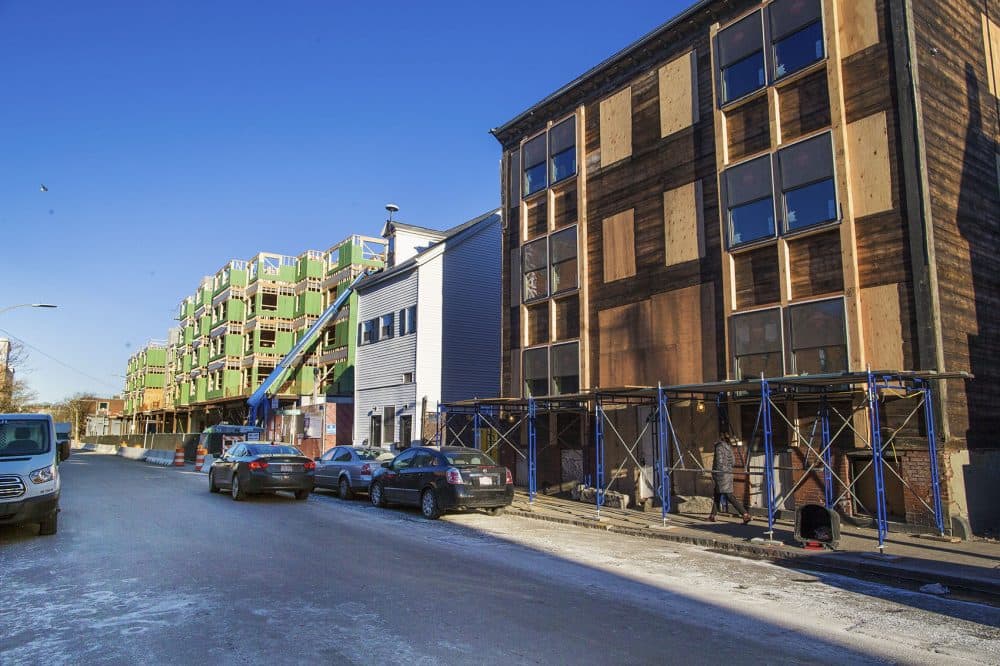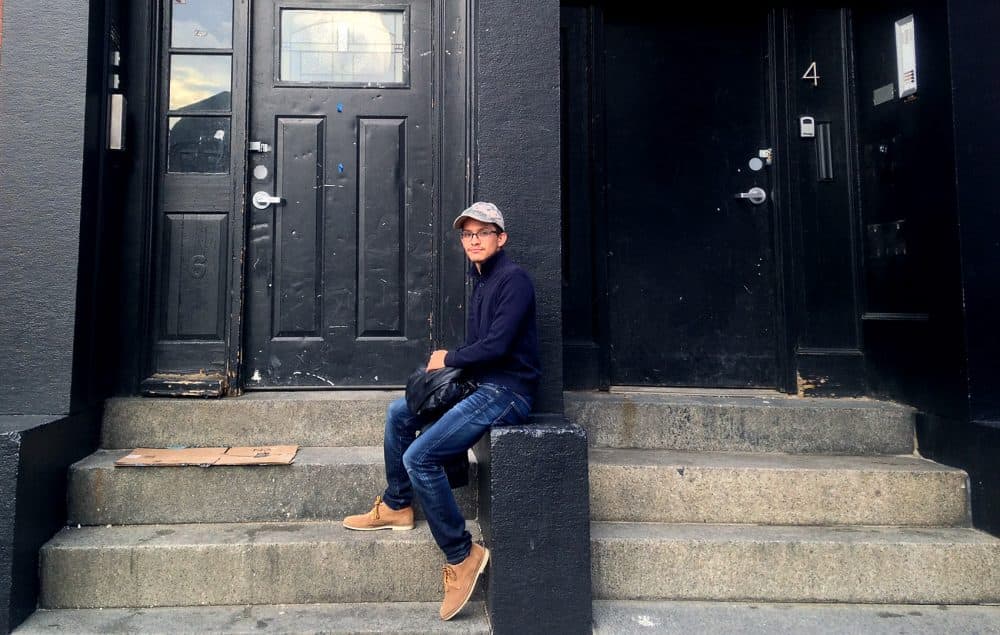Advertisement
What Amazon's HQ2 Could Mean For Housing In East Boston

East Boston is a neighborhood in transition. Construction cranes tower along the waterfront. Just blocks away, vacant, boarded-up buildings linger like ghosts. A wave of high-income earners fill up luxury condos. Still, the neighborhood clings to its close-knit, historically immigrant identity. Locals gather at cash-only bakeries, restaurants and barbershops to chat. Spanish cuts through the air. There’s a sense of community — but also, a sense of loss.
“Years ago, everything was owned by people that lived here,” says lifelong Eastie resident Kevin Umbro. “[Now] it’s all big investors from the outside. They don’t care how the neighborhood changes.”
And East Boston could change even more dramatically if another major investor — Amazon — arrives. Boston's bid for the tech giant pitches Suffolk Downs — a former racetrack that straddles East Boston and Revere — as the site for Amazon's second headquarters, which the company says could house as many as 50,000 workers with average salaries of more than $100,000.
The bid has raised concerns about how an Amazon headquarters could throttle the city’s already-tight housing market, particularly in East Boston.
A Tight Housing Market
Though rental prices citywide have recently stabilized, rents in East Boston have skyrocketed over the past five years, increasing by 30 percent from $1,853 in October 2012 to $2,412 in October 2017, according to Zillow estimates.
Rents have risen in part because the population is growing faster than the housing supply. East Boston — one of the city’s oldest immigrant neighborhoods, where more than half the residents are Latino — is caught in the midst of a demographic shift that’s happening throughout the city, as graduate students, young professionals and aging baby boomers flock to a growing Boston.
That makes housing a hot commodity in short supply. More than 95 of every 100 rental units in Boston are already occupied, according to The Boston Foundation's Greater Boston Housing Report Card, which translates to a rental vacancy rate of 4.7 percent — lower than Atlanta, Austin and Chicago, based on 2016 census data.
The shortage of available housing has led to a “seller’s market,” according to Barry Bluestone, a Northeastern University economist who co-authored the report card. It also highlights that as high-income earners move in, luxury rentals are hitting the market at a disproportionate level. Along Eastie’s waterfront, complexes like The Eddy have studios starting at $2,000 and two-bedroom apartments starting at $3,050.
With the housing market so tight, it’s unclear where Amazon’s workers would live — if they wanted to stay in Eastie. Boston’s bid cites the mayor’s plan to create 53,000 new units of housing by 2030, and the bid proposes building up to 10,000 units specifically at Suffolk Downs, which "could accommodate up to 20 percent of Amazon's on-site staff." But Bluestone says these numbers wouldn’t be enough to offset the impact of Amazon’s workers, who would bid up the price of housing.
“The 53,000 that Mayor [Marty] Walsh originally set was before Amazon was talking to us,” he says. “So we would probably have to up that number … if Amazon came here we’d have to boost that up by another 50,000.”

Displacement Concerns
East Boston’s rising rents have already started to push some residents out. Housing activists say displacement is on the rise.
“Most of the cases we are seeing are entire building clear-outs,” says Andres Del Castillo, with the housing advocacy nonprofit City Life/Vida Urbana. “Investors are buying up and displacing entire buildings off the money they assume they’re going to be able to make.”
Del Castillo says Latino residents are disproportionately affected.
When Maureen White moved to Maverick Square seven years ago, it was “very diverse.”
“You would walk around and you’d hear English, you’d hear Spanish, you’d hear Portuguese,” she says. “But I think what you’re starting to see is a lot of displacement of Latino families.”
White has only to walk down her street in Jeffries Point to see signs of a changing neighborhood. She points to a lot filled with gravel and construction equipment, where she says a five-story luxury condo is being planned. Near the corner, she points to another lot where she says two buildings were torn down and the families evicted.
“You’re just starting to see a lot of buildings get bought up, gutted out, which means all the people that live there are pushed out,” White says.
She considers herself lucky; she found her condo four years ago at an auction for $184,100 after a friend in the building tipped her off. It’s been a bargain for White, who makes about $55,000 a year as a freelance consultant. She says she couldn’t afford to rent or buy in the neighborhood now. And she’s worried about her neighbors who don’t own their homes — especially if a company like Amazon moves in.
'Shared Prosperity'
There's a delicate balance between the need for economic growth and residents' concerns about that growth. The city sees Amazon as a vehicle for development. Amazon says its second headquarters would bring more than $5 billion in capital expenditures.
John Barros, the city's chief economic officer, sees an opportunity for development without displacement.
"We can in fact grow a city that doesn't displace its poor, that includes minorities, women and others who have been marginalized in its economic growth," he says. "There's a shared prosperity model -- one that calls for the city to be able to develop without displacing its residents."
For East Boston Rep. Adrian Madaro, a Democrat, development is a "mixed bag" -- but it's happening, with or without Amazon.
"Whether or not Amazon comes, Suffolk Downs is getting developed. So we have to also be realistic about things," says the lifelong Eastie resident. "We need to see this as, 'Look, if this thing is coming anyway, let's look at it as an opportunity and let's try to get the housing that we need on that site, so that East Boston benefits.' "
City officials say they've made strides to tackle the housing crisis, beginning with Walsh's housing production target. Rents have stabilized, and the rental vacancy rate has improved for renters in the last three years, according to the housing Report Card. In October, the City Council passed the Jim Brooks Community Stabilization Act, a bill backed by Walsh, that requires landlords evicting tenants to notify the city, so the city can track evictions and inform tenants of their rights.
Politicians and economists agree: New business is crucial to Boston's economic growth.
"If you're not constantly infusing your community with new businesses, particularly in new industries, you become Detroit. You become Pittsburgh. You become Cleveland," Bluestone says. "Now, they're doing better today. But you go through decades of deterioration."
Though Bluestone agrees that Amazon could bring economic growth to the city, he's concerned about how it could affect lower-income residents.
“The people who will really be hurt ... will be the people who are displaced,” says Bluestone. “And those are the people I’m worried about.”
Affordable Housing
The anxiety hits East Boston resident Marina Maldonado at the end of every month. That’s when the rent is due. And it’s a lot more these days than when she moved into the neighborhood 11 years ago.
Maldonado, an immigrant from El Salvador, sits at her kitchen table, sipping hot tea, while her husband prepares to leave for work and her 7-year-old son watches TV in the next room.
She lives in a unit managed by the nonprofit agency Neighborhood of Affordable Housing (NOAH). Maldonado, who makes $11.50 an hour as a seamstress, is one of three breadwinners in the three-bedroom apartment. But she’s struggling to make ends meet. The rent is $2,000 a month.
She’s just an emergency away from coming up short on rent. And she doubts there’s anywhere else in East Boston she could afford.
“As workers, we don’t usually get more than minimum wage and it’s hard,” she says in Spanish. “Your life revolves around earning enough money for rentals, for the basics — never for the future.”
Boston’s bid for Amazon proposes a $75 million investment in affordable housing creation over 10 years. But affordable housing construction may not be a panacea for the housing crisis.
For one, there’s no precise definition of “affordable housing,” according to Jonathan Spader, senior research associate at Harvard’s Joint Center for Housing Studies. At the most basic level, affordable housing simply means any housing that is rented or sold below market rate. Not all affordable housing is subsidized by state or federal funds. Some of it is privately developed by nonprofits and assisted with loans from the city.
Affordable housing is difficult to finance and develop. "There's a lot that goes into lining up funding for an affordable housing project," says Madaro, who formerly sat on NOAH's board. "We do the best we can to always have projects in the pipeline. But certainly private development outpaces that of affordable housing."
And affordable housing isn’t always affordable for the lowest-income tenants, according to Chris Norris, executive director of the nonprofit Metro Housing Boston.
The city calculates affordability based on area median income — a metric that housing activists like Del Castillo take issue with, because it covers metropolitan areas rather than neighborhoods and, he says, gives a “skewed” perspective of what’s affordable. The area median income for a family of four in the Boston-Cambridge-Quincy area is $103,400.
Del Castillo’s concern is that an influx of thousands of Amazon workers, with average salaries of $100,000, would distort the city’s calculation even more.
And he worries about what an Amazon headquarters would mean for the neighborhood, if it doesn’t include locals in its plans.
“I think Amazon coming into this neighborhood, without an appropriate plan, is essentially signing up for wiping out this neighborhood,” Del Castillo says.
For now, Maldonado is scraping by as a seamstress but still anxious.
“If Amazon were to come to East Boston, there’s just no way that...the increase in rents and so forth is something that our family would be able to withstand anymore,” she says in Spanish. “We’ll absolutely be displaced.”
Amy Pollard recently completed her Bostonomix internship.